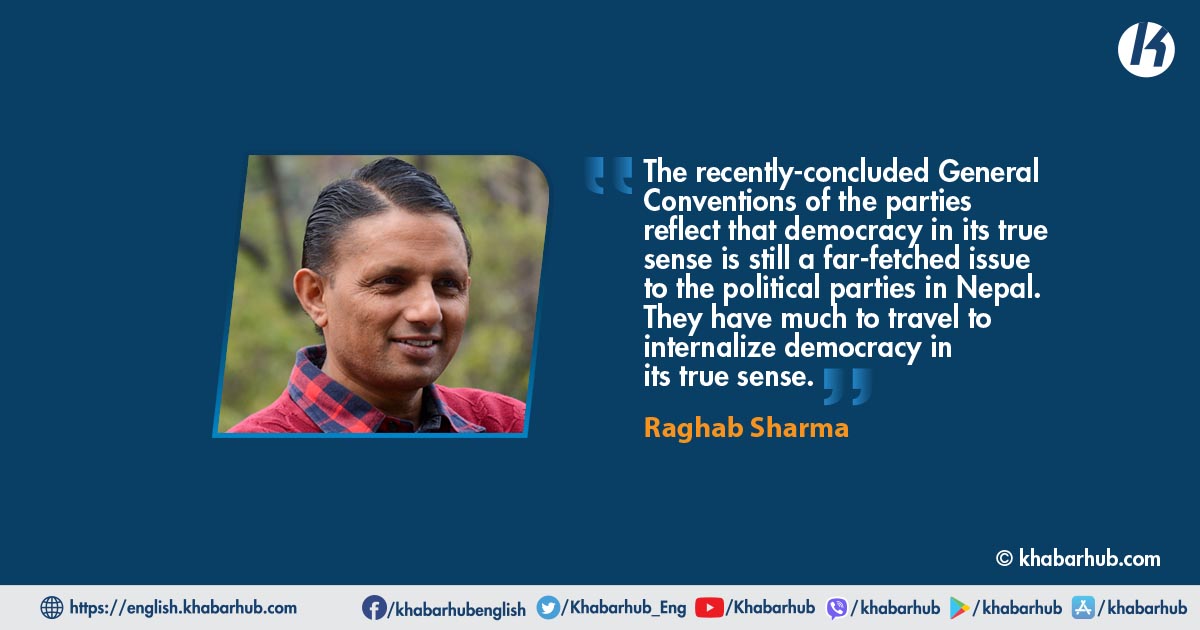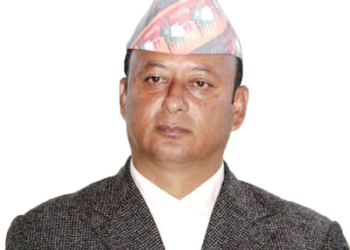Politics is said to lead the overall administration of the country. Abiding by the mandatory provisions at the Election Commission that the political parties should organize convention every five years, major political parties including the ruling Nepali Congress (NC), main opposition CPN-UML, Rastriya Prajatantra Party (RPP), and CPN-Maoist Center held their respective general conventions to elect their leadership.
However, their discussion in the convention and selection of the leadership reveals that democracy is still an uphill task for the political parties in Nepal.
General Conventions are believed to be the mega forums to discuss the party’s ideological stance, re-awaken party committees from local to the federal level, review the performance of the leadership, and revitalize the party making room for the new generations in the party.
Unfortunately, these massive forums organized with much pomp and show turned out like soap bubbles in institutionalizing democracy.
Former Prime Minister KP Oli-led CPN-UML organized a mass gathering in Chitwan, at the constituency of former Prime Minister and CPN-Maoist Center Chairman Pushpa Kamal Dahal “Prachanda”, during the inauguration of the party’s 10th General Convention.
Although Chair Oli defied the allegation that his intention was to mock Maoist Chair Prachanda, it’s crystal clear why the venue was shifted from Butwal to Chitwan.
UML General Convention worked well reorganizing the cadres in despair after the party split, yet skipped many fundamentals of democratic procedure.
The leadership’s failure to carry on the agenda formerly believed to have been introduced for public consumption and propaganda has already dispersed the party, once viewed by many as the harbinger of change in the country, and made the people feel disillusioned.
The Convention reelected party Chairman Oli, who had once been in defensive condition due to pile of corruption and misappropriation allegations ranging from Omni Group scam in health material procurement during coronavirus pandemic outbreak, undue influence of traders in the government, leasing to Yeti Group, Baluwatar land scam, then Minister Baskota’s audio demanding bribe, among dozens of other cases, as a centrifugal force in the party.
Neither anyone dared to demand his and party’s clarification on such issues, nor the Convention spared time to review the party ideology, roadmap and its guidelines.
Sadly, leaders including Ghanashyam Bhusal, Bhim Acharya, Bhim Rawal, Yogesh Bhattarai got lost in the group of sycophants eulogizing Oli.
Rather than setting a clear roadmap for the party, the UML General Convention further confused the party line on the most-discussed issues like MCC and Oil-government’s order not to publish the country’s new map in the textbooks.
Election in the convention was like the national election of Iraq during Saddam Hussein’s regime, where Hussein had claimed to have got 99 percent vote.
All leaders were under the fear of the anger of George Orwell’s Big Brother who could use the thought police against the cadres speaking openly.
Meanwhile, still viewed as the party of leaders with the legacy of the party-less Panchayat system, Rastriya Prajatantra Party (RPP) erstwhile led by three Chairmen Kamal Thapa, Pashupati Shumsher Jung Bahadur Rana and Dr. Prakash Chandra Lohani, re-vocalized the issue of a Hindu state and end of federalism in the country.
Although formerly regarded as the kingmaker in the party, Thapa was defeated by Rajendra Lingden, a leader groomed in politics by Thapa himself.
A party with a relatively weaker political organization at local levels, RPP’s local convention did not draw much attention.
However, change in the central leadership and dethronement of established Chairman Thapa is regarded as the rise of orthodox Royalists in the party.
After the defeat in the party leadership, Thapa himself accused former King Gyanendra Shah of playing foul in party politics.
According to Thapa, former King Shah used his secretariat against Thapa, as he (Thapa) had not been working as the palace puppet.
Likewise, the ruling Nepali Congress, the oldest democratic party in the political mainstream, seemed more democratic organizationally as elections were held from the local, district, provincial and national levels to choose the delegates.
Although the defeated leaders accused the winners of using money and muscle rather than working sincerely in the party, the selection process was, to a large extent, transparent even to the outsiders.
Prior to the NC General Convention, the party seemed divided between the establishment faction led by party President Sher Bahadur Deuba and the opposition faction represented by senior leader Ram Chandra Poudel and the Koiralas (Dr. Shekhar Koirala, Dr. Shahank Koirala).
Another faction led by Krishna Prasad Sitaula, though it expected to be the kingmaker, was seen as close to the party President Deuba.
Second-generation leaders in the party the Koiralas, Prakash Man Singh, Bimalendra Nidhi along with youth leaders Gagan Thapa, Bishwo Prakash Sharma, Guru Ghimire had been advocating for the change in leadership accusing the establishment of failing to retain the political and historical glory of the party.
However, the lack of proper coordination in the group offered one more chance for Deuba to claim the party Chair.
The agenda of change in the party’s leading post did not succeed this time as well. However, some energetic youths who dared to challenge the five-time Prime Minister and party President Deuba both politically and rhetorically in the open forums have managed to bag some key posts.
They are now in the trial of action — whether they can establish their agenda in the party and lead it ahead or be subservient to the leadership like their predecessors.
It was interesting to see the leaders including Prime Minister, Minister, federal and province lawmakers, Chief Minister, former Ministers, party’s office-bearer’s greetings and begging votes from the party delegates representing various places and organizations.
Unfortunately, like UML’s 10th General Convention, NC General Convention also did not give time to review, revise or rethink its party manifesto and confined itself in the selection of the leadership and formal discussion on party statute.
The Maoist Chair had sensed the dissatisfaction of the delegates and knew pretty well that he had fat chances of being criticized mercilessly.
Still hesitant, though in party statute, to join the parliamentary politics, CPN-Maoist Center also organized its General Convention meeting to meet the mandatory deadline to make it eligible for elections in the country.
The Maoist Center, with its history of a decade-long “People’s War”, thousands of war-victims expectations of substantive and revolutionary changes, the leadership’s commitment to re-vocalize the agenda of mainstreaming all classes, geographical regions, ethnic minorities and the promise to develop the Nepali model of development that suits 21st century was also eagerly observed by both national and international community.
The leadership’s failure to carry on the agenda formerly believed to have been introduced for public consumption and propaganda has already dispersed the party, once viewed by many as the harbinger of change in the country, and made the people feel disillusioned.
Former close aides of party Chairman Pushpa Kamal Dahal ‘Prachanda’, formerly described as two wings of the chairman, Dr. Baburam Bhattarai and Ram Bahadur Thapa ‘Badal’ have deserted Prachanda.
A group of party hardliners has split and is with senior leftist leader Mohan Baidya ‘Kiran’. Some youths who wanted to revolt against the party’s decision to sign the Comprehensive Peace Accord of 2006 first joined Netra Bikram Chand and got dispersed later.
Maoist Center which had once been the largest political party in the parliament has shrunk into a fringe party.
In this scenario, party Chair Prachanda had been under pressure to assure both the right-inclined and left-inclined cadres both inside and outside the party.
“I have dissected my steps as the main leader of the party, instead of putting blame on others, with regard to our situation now in the report to be submitted to this eighth General Convention of the party,” he said while addressing the inaugural session of the General Convention of the party on December 26.
The closed session of the convention discussed Prachanda’s high-sounding political dossier forming 25 panels of delegates.
NC did not let the delegates discuss the party course to be taken rather focused more on the selection of the central leaders as if, like a communist party, the lower committees or the party members were not literate enough to discuss the serious issues like the roadmap for the party and the ways leading to it.
The Maoist Chair had sensed the dissatisfaction of the delegates and knew pretty well that he had fat chances of being criticized mercilessly.
However, unlike UML Chair Oli who rather than confessing the past errors, spent his strength on showering blames defecting leader Madhav Nepal and once co-chair Prachanda, the Maoist Chair claimed to have come with ‘self-criticism’.
The document verbally mentioned some of the decisions like haphazard unification with UML and inability to address the agenda of ‘people’s war’ as shortcomings of the leadership; however, it signaled no substantive course correction for it did not dare to utter a single word related with compensation for the loss-bearers and punishment to the wrong-doers.
Thus, both Maoist Center and UML smelt a dictatorial organizational structure of the communist party though they neither resembled communism, socialism nor capitalism ideologically.
NC did not let the delegates discuss the party course to be taken rather focused more on the selection of the central leaders as if, like a communist party, the lower committees or the party members were not literate enough to discuss the serious issues like the roadmap for the party and the ways leading to it.
To sum up, the recent general conventions reflected that democracy in its true sense is still a far-fetched issue to the political parties in Nepal. They have much to travel to internalize democracy in its true sense.









Comment